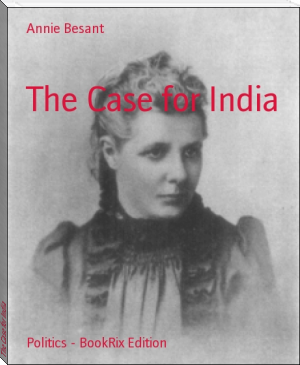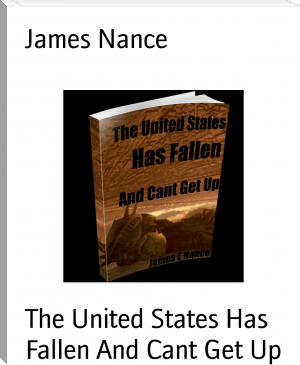The Case for India by Annie Besant (100 best novels of all time TXT) 📕

Read free book «The Case for India by Annie Besant (100 best novels of all time TXT) 📕» - read online or download for free at americanlibrarybooks.com
- Author: Annie Besant
Read book online «The Case for India by Annie Besant (100 best novels of all time TXT) 📕». Author - Annie Besant
Ever since the Government of India was taken over by the Crown, India has been regarded as an Imperial military asset and training ground, a position from which the jealousy of the East India Company had largely protected her, by insisting that the army it supported should be used for the defence and in the interests of India alone. Her value to the Empire for military purposes would not so seriously have injured at once her pride and her finances if the natural tendencies of her martial races had been permitted their previous scope; but the disarming of the people, 20 years after the assumption of the Government by the Crown, emasculated the Nation, and the elimination of races supposed to be unwarlike, or in some cases too warlike to be trusted, threw recruitment more and more to the north, and lowered the physique of the Bengalis and Madrasis, on whom the Company had largely depended.
The superiority of the Punjab, on which Sir Michael O'Dwyer so vehemently insisted the other day, is an artificial superiority, created by the British system and policy; and the poor recruitment elsewhere, on which he laid offensive insistence, is due to the same system and policy, which largely eliminated Bengalis, Madrasis and Mahrattas from the army. In Bengal, however, the martial type has been revived, chiefly in consequence of what the Bengalis felt to be the intolerable insult of the high-handed Partition of Bengal by Lord Curzon.
On this Gopal Krishna Gokhale said:
Bengal's heroic stand against the oppression of a harsh and
uncontrolled bureaucracy has astonished and gratified all
India.... All India owes a deep debt of gratitude to Bengal.
The spirit evoked showed itself in the youth of Bengal by a practical revolt, led by the elders, while it was confined to Swadeshi and Boycott, and rushing on, when it broke away from their authority, into conspiracy, assassination and dacoity: as had happened in similar revolts with Young Italy, in the days of Mazzini, and with Young Russia in the days of Stepniak and Kropotkin. The results of their despair, necessarily met by the halter and penal servitude, had to be faced by Lord Hardinge and Lord Carmichael during the present War. Other results, happy instead of disastrous in their nature, was the development of grit and endurance of a high character, shown in the courage of the Bengal lads in the serious floods that have laid parts of the Province deep under water, and in their compassion and self-sacrifice in the relief of famine. Their services in the present War--the Ambulance Corps and the replacement of its _materiel_ when the ship carrying it sank, with the splendid services rendered by it in Mesopotamia; the recruiting of a Bengali regiment for active service, 900 strong, with another 900 reserves to replace wastage, and recruiting still going on--these are instances of the divine alchemy which brings the soul of good out of evil action, and consecrates to service the qualities evoked by rebellion.
In England, also, a similar result has been seen in a convict, released to go to the front, winning the Victoria Cross. It would be an act of statesmanship, as well as of divinest compassion, to offer to every prisoner and interned captive, held for political crime or on political suspicion, the opportunity of serving the Empire at the front. They might, if thought necessary, form a separate battalion or a separate regiment, under stricter supervision, and yet be given a chance of redeeming their reputation, for they are mostly very young.
The financial burden incurred in consequence of the above conflicts, and of other causes, now to be mentioned, would not have been so much resented, if it had been imposed by India on herself, and if her own sons had profited by her being used as a training ground for the Empire. But in this case, as in so many others, she has shared Imperial burdens, while not sharing Imperial freedom and power. Apart from this, the change which made the Army so ruinous a burden on the resources of the country was the system of "British reliefs," the using of India as a training ground for British regiments, and the transfer of the men thus trained, to be replaced by new ones under the short service system, the cost of the frequent transfers and their connected expenses being charged on the Indian revenues, while the whole advantage was reaped by Great Britain. On the short service system the Simla Army Commission declared:
The short service system recently introduced into the British
Army has increased the cost and has materially reduced the
efficiency of the British troops in India. We cannot resist the
feeling that, in the introduction of this system, the interest
of the Indian tax-payer was entirely left out of consideration.
The remark was certainly justified, for the short service system gave India only five years of the recruits she paid heavily for and trained, all the rest of the benefit going to England. The latter was enabled, as the years went on, to enormously increase her Reserves, so that she has had 400,000 men trained in, and at the cost of, India.
In 1863 the Indian army consisted of 140,000 men, with 65,000 white officers. Great changes were made in 1885-1905, including the reorganisation under Lord Kitchener, who became Commander-in-Chief at the end of 1902. Even in this hasty review, I must not omit reference to the fact that Army Stores were drawn from Britain at enormous cost, while they should have been chiefly manufactured here, so that India might have profited by the expenditure. Lately under the necessities of War, factories have been turned to the production of munitions; but this should have been done long ago, so that India might have been enriched instead of exploited. The War has forced an investigation into her mineral resources that might have been made for her own sake, but Germany was allowed to monopolise the supply of minerals that India could have produced and worked up, and would have produced and worked up had she enjoyed Home Rule. India would have been richer, and the Empire safer, had she been a partner instead of a possession. But this side of the question will come under the matters directly affecting merchants, and we may venture to express a hope that the Government help extended to munition factories in time of War may be continued to industrial factories in time of Peace. The net result of the various causes above-mentioned was that the expense of the Indian army rose by leaps and bounds, until, before the War, India was expending, L21,000,000 as against the L28,000,000 expended by the United Kingdom, while the wealthy Dominions of Canada and Australia were spending only 1-1/2 and 1-1/4 millions respectively. (I am not forgetting that the United Kingdom was expending over L51,000,000 on her Navy, while India was free of that burden, save for a contribution of half a million.)
Since 1885, the Congress has constantly protested against the ever-increasing military expenditure, but the voice of the Congress was supposed to be the voice of sedition and of class ambition, instead of being, as it was the voice of educated Indians, the most truly patriotic and loyal class of the population. In 1885, in the First Congress, Mr. P. Rangiah Naidu pointed out that military expenditure had been L1,463,000 in 1857 and had risen to L16,975,750 in 1884. Mr. D.E. Wacha ascribed the growth to the amalgamation scheme of 1859, and remarked that the Company in 1856 had an army of 254,000 men at a cost of 11-1/2 millions, while in 1884 the Crown had an army of only 181,000 men at a cost of 17 millions. The rise was largely due to the increased cost of the European regiments, overland transport service, stores, pensions, furlough allowances, and the like, most of them imposed despite the resistance of the Government of India, which complained that the changes were "made entirely, it may be said, from Imperial considerations, in which Indian interests have not been consulted or advanced." India paid nearly, L700,000 a year, for instance, for "Home Depots"--Home being England of course--in which lived some 20,000 to 22,000 British soldiers, on the plea that their regiments, not they, were serving in India. I cannot follow out the many increases cited by Mr. Wacha, but members can refer to his excellent speech.
Mr. Fawcett once remarked that when the East India Company was abolished
the English people became directly responsible for the
Government of India. It cannot, I think, be denied that this
responsibility has been so imperfectly discharged that in many
respects the new system of Government compares unfavourably
with the old.... There was at that time an independent control
of expenditure which now seems to be almost entirely wanting.
Shortly after the Crown assumed the rule of India, Mr. Disraeli asked the House of Commons to regard India as "a great and solemn trust committed to it by an all-wise and inscrutable Providence." Mr. George Yule, in the Fourth Congress, remarked on this: "The 650 odd members had thrown the trust back upon the hands of Providence, to be looked after as Providence itself thinks best." Perhaps it is time that India should remember that Providence helps those who help themselves.
Year after year the Congress continued to remonstrate against the cost of the army, until in 1902, after all the futile protests of the intervening years, it condemned an increase of pay to British soldiers in India which placed an additional burden on the Indian revenues of L786,000 a year, and pointed out that the British garrison was unnecessarily numerous, as was shown by the withdrawal of large bodies of British soldiers for service in South Africa and China. The very next year Congress protested that the increasing military expenditure was not to secure India





Comments (0)